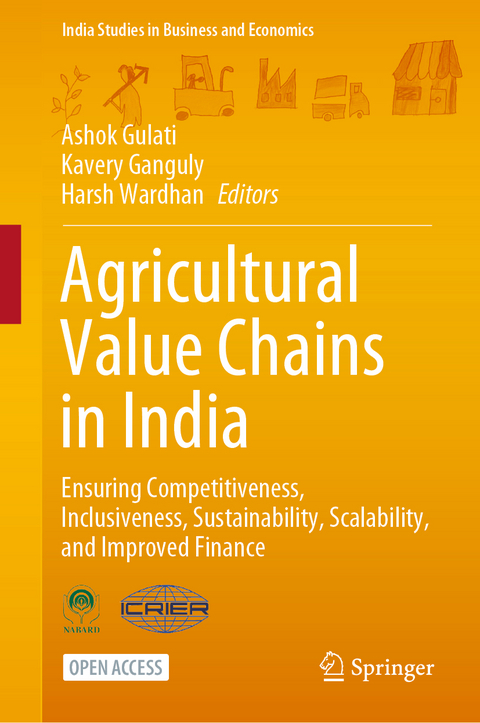
Agricultural Value Chains in India
Springer Verlag, Singapore
978-981-334-267-5 (ISBN)
This open access book provides a clear holistic conceptual framework of CISS-F (competitiveness, inclusiveness, sustainability, scalability and access to finance) to analyse the efficiency of value chains of high value agricultural commodities in India. It is based on the understanding that agriculture is an integrated system that connects farming with logistics, processing and marketing. Farmer’s welfare being central to any agricultural policy makes it very pertinent to study how a value chain works and can be strengthened further to realize this policy goal. This book adds value to the existing research by studying the value chains end-to-end across a wide spectrum of agricultural commodities with the holistic lens of CISS-F. It is not enough that a value chain is competitive but not inclusive or it is competitive and inclusive but not sustainable. The issue of scalability is very critical to achieve macro gains in terms of greater farmer outreach and sectoral growth. The research undertaken here brings out some very useful insights for policymaking in terms of what needs to be done better to steer the agricultural value chains towards being more competitive, inclusive, sustainable and scalable. The value chain specific research findings help draw very nuanced policy recommendations as well as present a big picture of the future direction of policy making in agriculture.
Ashok Gulati is the Infosys Chair Professor for Agriculture at Indian Council for Research on International Economic Relations (ICRIER). Prior to this, he was the Chairman of the Commission for Agriculture Costs and Prices (CACP), Government of India. He also served as the Director at the International Food Policy Research Institute (IFPRI) for more than 10 years. He is also currently on the Central Board of Directors of the Reserve Bank of India (RBI), National Bank for Agriculture and Rural Development (NABARD) and National Commodity and Derivatives Exchange (NCDEX). He has 15 books and several research papers on Indian and Asian agriculture to his credit. Dr Gulati is a prolific writer in leading media on agri-policies. He was honoured with "Padma Shri” award in 2015 by the President of India for his significant contribution in the area of agricultural economics and policymaking. Kavery Ganguly is a Senior Research Fellow at Indian Council for Research on International Economic Relations (ICRIER). She began her career with International Food Policy Research Institute (IFPRI), and worked as Lead – Policy Advocacy and Research with CII-Food and Agriculture Centre of Excellence. She also worked as an independent consultant on Political Economy of Food Price Policy, jointly led by Copenhagen University, Cornell University and UNU-WIDER. Kavery has been working in the area of agriculture and food policy research and advocacy for the past 17 years.She has contributed to research publications including book chapters, research reports, and peer reviewed papers. Harsh Wardhan is a Consultant at ICRIER, working on issues related to agricultural and food policies, agricultural value chains and food prices. He has over seven years of research experience. Prior to ICRIER, he worked as a consultant with Office of Economic Advisor, Ministry of Commerce & Industry, GoI and as Research/Academic Associate at Indian Institute of Management (IIM), Ahmedabad. He has co-authored a book, Marketed and Marketable Surplus of Major Foodgrains in India, Springer 2017. He has also published research reports, book chapters, and articles in reputed journals and newspapers. He has completed his Master’s in Economics from Ambedkar University, Delhi (AUD) and Bachelor’s in Economics from Kirori Mal College, University of Delhi
Chapter 1: Introduction.- Chapter 2: Evaluating Agricultural Value Chains on CISS-F Framework.- Chapter 3: Decoding Value Chains of Tomatoes, Onions and Potatoes (TOP).- Chapter 4: Towards an Efficient Banana and Mango Value Chains in India.- Chapter 5: Analysis of Grapes and Pomegranates Value Chain.- Chapter 6: Towards Creation of an Efficient Dairy Value Chain.- Chapter 7: Poultry Value Chain in India.- Chapter 8: Pulses in India: A Value Chain Analysis.- Chapter 9: Developing Agricultural Value Chains in India- the Way Forward.
| Erscheinungsdatum | 29.12.2021 |
|---|---|
| Reihe/Serie | India Studies in Business and Economics |
| Zusatzinfo | 153 Illustrations, color; 3 Illustrations, black and white; XXXV, 298 p. 156 illus., 153 illus. in color. |
| Verlagsort | Singapore |
| Sprache | englisch |
| Maße | 155 x 235 mm |
| Themenwelt | Naturwissenschaften ► Biologie ► Ökologie / Naturschutz |
| Wirtschaft ► Betriebswirtschaft / Management ► Logistik / Produktion | |
| Weitere Fachgebiete ► Land- / Forstwirtschaft / Fischerei | |
| ISBN-10 | 981-334-267-6 / 9813342676 |
| ISBN-13 | 978-981-334-267-5 / 9789813342675 |
| Zustand | Neuware |
| Haben Sie eine Frage zum Produkt? |
aus dem Bereich


